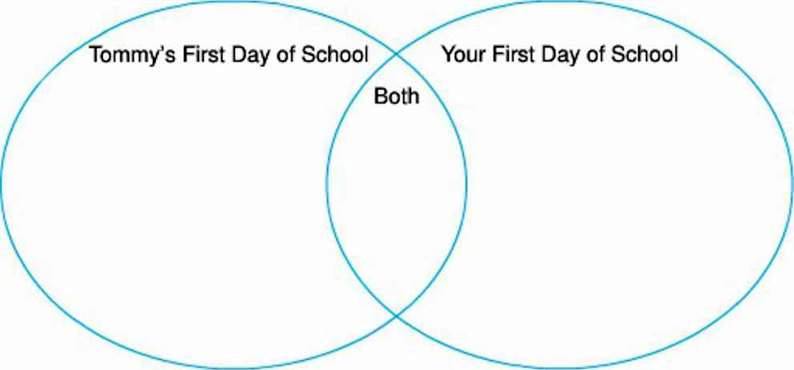Lesson 76
Unit 7 MY SCHOOL
Lesson 76
1. Read about English in the third millennium.
ENGLISH IN THE THIRD MILLENNIUM
Two thousand years ago English didn’t exist. A thousand years ago it was a language used by less than two million people. Now it is the most influential language in the world, spoken by more than a billion people on the planet, as the first, second or third language. English currently dominates science, business, the mass media and popular culture. For example, 80% of e-mails on the Internet are in English.
2. Answer the questions about English in the third millennium.
1. How many years ago English didn’t exist?
2. How many people used English one thousand years ago?
3. What kind of language is English now?
4. How many people on the planet speak English now?
5. In which spheres does English currently dominate?
6. Are 100% or 80% of e-mails on the Internet in English?
3. Look at the

4. Make the sentences interrogative.
1. Ukrainian dominates business and mass media. 2. Polish is the most influential language in the world. З. I shall send more than 120 e-mails next year 4. Tania was good at swimming. 5. We played language games last lesson. 6. Many people will have billions in the third millennium. 7. I am translating sentences from Ukrainian into English.
5. Act out the short dialogues and make up similar ones.
1. A: Two thousand years ago English didn’t exist.
B: How many years ago?
2. A: Two thousand years ago English didn’t exist.
B: Right. But now it dominates science, business, the mass media and popular culture.
3. A: I am good at Maths. I can help you with your hometask.
B: Good ideal When will you have time?
4. A: What are you interested in?
B: What am I interested in?
5. A: A thousand years ago English was used by less than two million people.
B: You are right. But do you know how many people speak
A: Sure. English is spoken by more than a billion people on the planet now.
6. Write German/French equivalents to English word combinations. Make up three sentences with them.
I can help you. What are you interested in? Good idea. I am good at History.
7. Go to the library and make a research.
1. How many years ago did Ukrainian language appear?
2. How many people used Ukrainian one thousand years ago?
3. Is this language influential in the world?
4. How many people on planet speak it now?
5. Do people in the world learn Ukrainian as the first, second or third language?
8. Compare the importance of English and Ukrainian languages.
Ukrainian | English |
2000 years ago | Did not exist |
1000 years ago | |
Now |
SELF-ASSESSMENT MODULE 7
LEVEL 1
1. Find 7 words and write them down.

2. Choose the correct item.
1. I… English
A) was learning b) were learning.
2. We… games.
A) was playing b) were playing.
3. They… reports.
A) was preparing b) were preparing.
4. He… doing his home assignment.
A) was not b) were not
3. Write five sentences about your school studies.
LEVEL 2
1. Write in the vowels.
Frgn, chmstr, big, phscs, sbjcts, schl, Issn, fvrt, ttnd
2. Complete the text by the words from the box.
Had, was beginning, had peeped, thought, was reading
Alice (1)… to get very tired of sitting by her sister on the bank and of having nothing to do: once or twice she (2)… into the book her sister (3)…, but it (4)… no pictures or conversations in it, “and what is the use of a book,” (5)… Alice, “without pictures or conversations?”
3. Write about 10 sentences about your favourite subject.
LEVEL З
1. Write down as many words and word combinations as you can under each heading.
Objects which can be used in a classroom | School subjects | Activities at the lessons |
2. Choose the best item (a, b, c or d) for each space.
As soon as the war was over, the refugees (1)… to go back to the villages they (2)… about five years earlier When they arrived, they (3)… that other groups from the east had moved into the ruined houses and (4)… rebuilding them.
1. a) have tried | B) had tried | C) tried | D) were trying |
2. a) have left | B) had left | C) leave | D) were leaving |
3 a) have found | B) had found | C) found | D) were finding |
4. a) are | B) have | C) had | D) were |
3. Describe the activities you do at your English lessons at school.
PROJECT WORK
1. Discuss in class what you already know about individual staff, i. e.
Title: Ms/Mrs/Miss/Mr
Role within the school: Head of Department, head staff.
Subject(s) taught: …
Outside interests: …, etc.
2. Construct a list of all or some of the staff. Secretarial and catering staff can also be included.
3. Interview the staff, select their photographs, and write a brief impression of them.
4. Agree on questions to ask (see step 1 above). Other questions to ask could include:
How long have you been teaching at this school?
What do you do in the holidays?
What is your favourite TV programme?, etc.
5. Present the information. Written texts can be prepared to accompany the photographs.
Example: This is…. He teaches geography and has been here for six years. He is married and has two children. He plays tennis and travels a lot in his spare time. His favourite TV programme is Discovery, etc.
SUPPLEMENTARY READING
TASK 1
1. Read the text about babysitting and say whose point of view you share. Explain why.
WHY DO I HAVE TO BE A BABYSITTER?
When one large group of teenagers was asked, “Which chores do you think teenagers should do around the house?”, babysitting was listed by 32% (percent). The responses were different. “I love little children”, said one teenage girl, “so it’s no problem.” One teenage boy even boasted: “I enjoy the power!” ‘I do it because I know my parents need help”, explained a young girl. “But I’m not happy about it,” said another girl, “I sometimes want to go to the movies or something”, but my mother will say, ‘Take your little brother along”; I really don’t want to.”
Yes, baby sitting responsibilities are a fact of life for today’s youths. More and more mothers must work both at home and on an outside job. They are often stressed to the limit.
A babysitter makes it possible for mum and dad to get some needed relief from time to time. True, parents may hire an outsider to babysit, but wouldn’t they feel more secure knowing that their smaller children were in the hands of a loving family member?
One young woman recalls caring for her brothers and her baby sister while her mother, a single parent, worked as a waitress: “Every day I’d look after them until Mama got home. She would leave me a list of things to do: “Hang up the clothes, clean the house, start dinner.” Quite a burden for a teenage girl I But she says: “Now I can see that it was the best thing in the world for me. I grew up faster and became responsible.”
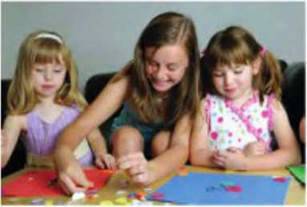
2. Add your ideas:
Babysitting teaches: to love little children, to become responsible,…
3. Write how you feel about babysitting your younger brothers and sisters. Is it better to hire an outsider to babysit? Why,’Why not”; Which chores do teenagers in Ukraine do around the house? And you?
TASK 2
1. Read about the three Tytla brothers and answer the questions given after the text.
THE THREE TYTLA BROTHERS
A young couple in Pidhajtsi, Temopil region, Spiridon and Olga Tytla became the proud parents of three sons: Bohdan, born 1927, Markian (1929), and Ewhen (1930). The boys studied in the local school and were active in the local social activities.
The Second World War changed their lives. They found themselves in the USA. In the USA Bohdan began to study art. His artistic talent revealed itself in landscapes. He received a lot of awards for his works of art.
In 1993-1998 he travelled in Ukraine. Later B. Tytla produced a large number of pictures in which he rendered the very soul and spirit of the Ukrainian scenery. Bohdan’s paintings are famous for their lyrical and poetic quality.
Bohdan Tytla’s wife, Halyna, studied iconography with Petro Cholodny, the younger. Her works decorate several churches in the USA and in Ukraine.
Markian worked in Ukrainian Credit Union as a director. All his life he was very active in Plast, a Ukrainian Youth Organization. Markian Tytla received the highest award for his work in Plast, the award of St. George in Gold. His wife, Natalia, is a kind, sensitive, patient and generous mother and a devoted wife. She and her husband raised two sons and twin daughters.
The heart of the youngest brother, Ewhen, was in singing. He studied voice with Andry Dobriansky and sang in many Choruses as lead tenor and soloist. The Dumka Chorus of NY, Ukrainian Bandurist Chorus in Detroit, the Millenium Chorus of North America, Lysenko Opera Chorus in Toronto were some of the groups that he sang with. Ewhen had quite a few personal solo performances and took part in Ukrainian opera productions. He also made a solo recording which was very well received. His singing took him to many countries. With the Ukrainian Bandurist Chorus, he toured Ukraine twice (1991 and 1994) on the invitation of the Ukrainian government. At that time the Chorus received the Taras Shevchenko Award from President L. Kravchuk. His wife, Bohdana, travelled with her husband. She acted as an archivist of the chorus, audio and video taping the appearances. They were a very hospitable, friendly and intelligent family. After the death of Ewhen (1999), Bohdana takes an active part in the work of Plast.
1. How many children did Spiridon and Olha Tytla have?
2. What changed the life of Tytla’s family?
3. Who sang in many choruses as lead tenor and soloist? Name some of the choruses that he sang with.
4. Who of the three brothers became an artist?
5. Who acted as an archivist of the chorus? Tell about her activities.
6. Who studied iconography? Where one can find her works?
7. Who was very active in Plast? What award did he receive for his activity in Plast?
8. What kind of woman is Natalia Tytla?
2. Tell about Tytla’s families.
TASK З
1. Read the story.
CHARLIE AND THE CHOCOLATE FACTORY
By Roald Dahl
I
These two very old people are the father and mother of Mr. Bucket. Their names are Grandpa Joe and Grandma Josephine.
These two other very old people are the father and mother of Mrs. Bucket. Their names are Grandpa George and Grandma Georgina.
Mr. and Mrs. Bucket have a small boy whose name is Charlie Bucket.
How d’you do? And how d’you do? And how d’you do again?
He is pleased to meet you.
The whole of this family – the six grown-ups (count them) and little Charlie Bucket – live together in a small wooden house on the edge of a great town.
The house wasn’t nearly large enough for so many people, and life was extremely uncomfortable for them all. There were only two rooms in the place >
Grandpa Joe and Grandma Josephine on this side, Grandpa George and Grandma Georgina on that side.
Mr. and Mrs. Bucket and little Charlie Bucket slept in the other room, upon mattresses on the floor.
In the summertime, this wasn’t too bad, but in the winter, freezing cold draughts blew across the floor all night long, and it was awful.
There wasn’t any question of them being able to buy a better house – or even one more bed to sleep in. They were far too poor for that.
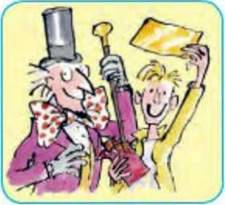
2. Tell what you have learned from the story.
TASK 4
1. Read the story. Was your prediction confirmed?
CHARLIE AND THE CHOCOLATE FACTORY
By Roald Dahl II
Mr. Bucket was the only person in the family with a job. He worked in a toothpaste factory, where he sat all day long at a bench and screwed the little caps on to the tops of the tubes of toothpaste after the tubes had been filled But a toothpaste capscrewer is never paid very much money, and poor Mr. Bucket, however hard he worked, and however fast he screwed on the caps, was never able to make enough to buy one half of the things that so large a family needed. There wasn’t even enough money to buy proper food for them all.
The only meals they could afford were bread and margarine for breakfast, boiled potatoes and cabbage for lunch, and cabbage soup for supper. Sundays were a bit better. They all looked forward to Sundays because then, >
The Buckets, of course, didn’t starve, but every one of them – the two old grandfathers, the two old grandmothers, Charlie’s father, Charlie’s mother, and especially little Charlie himself – went about from morning till night with a horrible empty feeling in their tummies.
Charlie felt it worst of all. And >
Walking to school in the mornings, Charlie could see great slabs of chocolate piled up high in the shop windows, and he would stop and stare and press his nose against the glass, his mouth watering like mad. Many times a day, he would see other children taking bars of creamy chocolate out of their pockets and munching them greedily, and that, of course, was pure torture.
Only once a year, on his birthday, did Charlie Bucket ever get to taste a bit of chocolate. The whole family saved up their money for that special occasion, and when the great day arrived, Charlie was always presented with one small chocolate bar to eat all by himself. And each time he received it, on those marvelous birthday mornings, he would place it carefully in a small wooden box that he owned, and treasure it as though it were a bar of solid gold; for the next few days, he would allow himself only to look at it, but never to touch it. Then at last, when he could stand it no longer, he would peel back a tiny bit of the paper wrapping at one corner to expose a tiny bit of chocolate, and then he would take a tiny nibble-just enough to allow the lovely sweet taste to spread out slowly over his tongue.
The next day, he would take another tiny nibble, and so on, and so on. In this way, Charlie would make his sixpenny bar of birthday chocolate last him for more than a month.
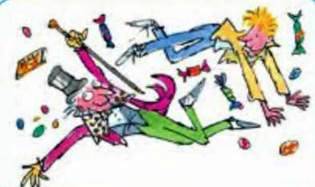
2. Tell what you have learned from the story. Do you know needy families in your neighbourhood? How could you help the children from these families?
TASK 5
1. Read the text.
WHAT DO YOU KNOW ABOUT TEMPERATURE?
What is more relaxing than stepping into a warm shower or bath on a chilly day? But if the water is too hot or too cold, you may feel discomfort and spend as little time bathing as possible. What makes taking a shower or a bath a pleasant experience instead of a shock?
Of course, it is the temperature of the water.
The temperature of the air outside is also an everyday concern. Knowing the temperature helps us to decide how to dress and how to plan our day. Since knowledge of the temperature is so useful, public buildings often display it along with the time.
Depending on where you live, the number displayed may reflect entirely different conditions. Why, for example, would a reading of 40 degrees in the United States call for putting on a coat, whereas a 40-degree reading in Europe would call for the lightest possible clothing?
Very simply, where the Fahrenheit scale is used, such as in the United States, 40 degrees is cold. However, in Europe, where the Celsius scale is commonly used, 40 degrees registers a temperature that is very hot.
Since both the Fahrenheit and Celsius scales are in common use today, it is often necessary to convert from one to the other. How is this done?
To change from Fahrenheit to Celsius, first subtract 32 from the Fahrenheit temperature Then multiply the difference by 5/9. As an example, say the Fahrenheit temperature is 104 degrees. To arrive at the Celsius temperature, substract 32 from 104, which gives 72.
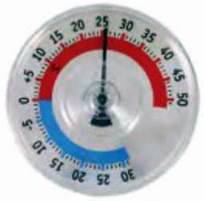
Then multiply 72 by 5/9 The result is 40, which is the Celsius temperature.
1) 104 – 32 = 72
2) 72 ∙ 5 : 9 = 40
On the other hand, to change from Celsius to Fahrenheit, you need to multiply the degrees Celsius by 9/5 and then add 32. So, as an example, say the temperature is 20 degrees Celsius. What does that equal on the Fahrenheit scale? Multipliying 20 by 9/5, you get 36.
By adding 32 to 36, you arrive at the Fahrenheit temperature of 68 degrees.
1) 20 ∙ 9 : 5 = 36
2) 32 + 36 = 68
2. Were your predictions confirmed? Did they change as you read? How did they change?
3. Convert the temperature from the Fahrenheit to the Celsius and vice versa.
40° F = …°С 55° F = …°С 78°F = …°С
-5°C = …°F 20°C = …°F – 10°C = …°F
TASK 6
1. Remember what you know about the foundation of Kyiv. Read the title of the text. What do you expect to learn? Read the text. Were your guesses correct? What new information have you learned?
A LEGEND ABOUT THE FOUNDATION OF KYIV
Part 1
Once there lived three brothers: Kyi, Schek and Khoriv, and they had a sister Lybid. One day they were boating along the beautiful banks of the Dnipro. They saw three green hills covered with a thick forest.
“This is a fine place,” said Kyi. “Let us settle here.” So, they settled on those three hills.
Kyi, the eldest brother, was a tall strong handsome man. He was a fine boatman. He was also a gifted craftsman and made fine boats. People used to come to buy his boats or to learn how to make them. Kyi loved the river and spent much time on the Dnipro.
Schek, the younger brother, had a freckled face, green eyes and red hair. He was a very good potter. He made wonderful jugs and basins of clay.
Khoriv, their youngest brother, had hazel eyes and fair hair He was a fine ps>
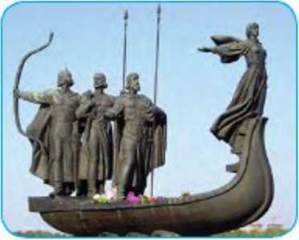
Their sister, Lybid, was a pretty girl with blue eyes and long golden hair. She was gentle and modest. Lybid was a very good spinner and her snow-white linen was famous among the Polian women. The three brothers loved their sister very much and took care of her.
By and by many people settled around the three hills near the Dnipro. The three brothers always helped their neighbours.
For a long time the people lived happily, but one day their enemy, the Avar tribe, came to their land.
TASK 7
1. Remember what you know about the foundation of |Kyiv. Read the title of the text. What do you expect to learn? Read the text. Were your guesses correct? What new information have you learned?
A LEGEND ABOUT THE FOUNDATION OF KYIV
Part II
The invaders robbed the Polian houses and burnt them down. They wanted to make the people their slaves. The Polians were brave people. They did not run from their enemies but began to fight with them. They bravely defended their homes, their wives and their children.
Kyi, Schek and Khoriv were in the first ranks of the fighters. The three brothers fought bravely and killed many of their enemies.
The Polian tribe and the Avar tribe fought for many days but neither side could win.
Then the chief of the Avar tribe said, “Let us have a single combat between two warriors, I’ll fight for my people and one of your warriors will fight for your people. If I win, your people will pay a big tribute to us every year. If I am defeated, my people will leave your land forever.”
TASK 8
1. Remember what you know about the foundation of Kyiv. Read the title of the text. What do you expect to learn? Read the text. Were your guesses correct? What new information have you learned?
A LEGEND ABOUT THE FOUNDATION OF KYIV
Part III
Schek and Khoriv wanted to fight the single combat but Kyi said, “I am the eldest brother, I will fight.”
The single combat began. It was the most terrible combat that took place on the banks of the Dnipro. Long and bitter was the struggle. The Avar chief was a man of great strength and Kyi could not overcome him. At last the Avar chief aimed his spear at Kyi’s heart. Kyi threatened him with his oar.
There was a terrible blow and… the spear and the oar were broken.
“Come then, my hands will serve me as they served me in my work,” cried Kyi. He seized the Avar chief, lifted him into the air and threw him into the Dnipro. That was the end of the enemy. The Avars ran away as quickly as they could.
Great was the joy of the Polians and the people said, “You have won the victory, Kyi. You are both strong and wise. You are honest, and we respect you. Be our Prince.”
Kyi became the first Prince of the Polian tribe. He said to his people, “We must unite and we must always be ready to defend our land and our people. That’s why we must build a high wall around our settlement. It will defend us from enemies.” And the Polians built the first walled town on one of the hills at the river Dnipro and named it Kyiv in honour of their Prince.
TASK 9
1. Do you remember your first day of school? Share your impressions with your friend. Read the first part of the text about Tommy’s first day of school.
THE FIRST DAY OF SCHOOL
By Tomie dePaola
Part I
The first day of school arrived! I was excited and nervous all at once We got to school and the bell rang. We all lined up by class. Last year’s sixth-graders were not there They had gone to Lincoln Junior High School We all filed into Miss Immick’s room.
“Well, hello, boys and girls,” she said. “I hope we all had a wonderful summer vacation.”
Another bell rang. We stood at attention and recited the Pledge of Allegiance to the flag.
Then Miss Immick had us all sit down on the floor. It had been polished until it shone like a mirror.
On the first day of school everything was clean and shiny and smelled of floor wax and lemon oil polish The blackboards were the cleanest they’d be all year The waxed wooden floors in the hallways squeaked when you walked on them.
The first day of school was always special to me. I wondered when we would find out which first grade we were in But I didn’t say anything.
“Now, boys and girls, I’m going to read you a story until Miss Philomena gets here.”
Miss Philomena was the school secretary, and she would tell us about first grade.
Miss Immick was in the middle of the story when Miss Philomena came in carrying a big book called a ledger book. You could hear a pin drop. I didn’t care if I ever heard the end of the story!
“Good morning, boys and girls. The following children will please go very quietly and quickly to room two across from Miss Pagnam’s kindergarten room. It is Miss Kiniry’s room.” She started to read out names. I thought I would die.
“Tommy dePaola,” she called out. I thought I would faint. I didn’t move.
“Tommy, I called your name,” Miss Philomena said.
This time I got up and started to walk out of the room.
“Congratulations, Tommy,” Miss Immick whispered to me as I walked by her.
I went into Miss Kiniry’s room. She looked prettier than ever.
“Welcome, children,” she said. “And yes, Tommy. We do learn how to read this year.”
“When?” I asked.
“Friday,” Miss Kiniry answered.
It was Wednesday The first day of school was always on Wednesday
We were given our own desks – real desks – with chairs. My desk was in the row next to the windows. I was in the first seat. We would always sit in the same place.
I looked around the room. The bulletin boards were all decorated with pictures and words that I couldn’t read yet. Across the top of the blackboard stood twenty – six alphabet cards with a capital letter and a smaller letter on each. First grade was going to be fun!
One of the first things we did was to make a colour wheel Miss Kiniry gave each of us a pencil, a box of school crayons, and a round cardboard milk-bottle top.
“Now, boys and girls,” she said, “carefully draw around the milk-bottle tops. Make six circles on your paper. Do it just like I have drawn it on the blackboard.” Then we had to colour in the circles in the right order – red, orange, yellow, green, blue, violet.
It was really something how some of the kids couldn’t stay in the lines and how messy they coloured. Because I was going to be an artist when I grew up, my colour wheel was very neat. Miss Kiniry stuck a gold star on it!
TASK 10
1. Read the second part of the text about Tommy’s first day of school.
THE FIRST DAY OF SCHOOL By
Tomie dePaola
Part II
On Friday morning, when I came into my first-grade room, Miss Kiniry whispered, ‘This afternoon!”
I knew what she meant. I practically flew home for lunch and flew back to school. (We ate lunch at home in those days.)
“Well, Tommy, you are the first one back,” Miss Kiniry said as the other kids walked in behind me. She went over to the big activity table in front of the room. There were three piles of books – a yellow pile, a red pile, a blue pile. All the books were the same inside, but each one had a different coloured cover.
When everyone was back in their seats, Miss Kiniry handed the books out. She gave me a blue one. I would be in the blue reading group.
“Now, class, don’t open your books until I tell you.” I peeked quickly. Ooopsl The pictures that I saw weren’t very exciting.
Then Miss Kiniry went to an easel at the front of the room. It was covered with a cloth. She held her pointer-a long wooden thing with a red rubber tip on it. She took the cloth off. There was a big book just like ours.
“Open your books,” she said. She opened the big book. “Now follow along with me.” She pointed at the words and read aloud. “See Dick run. Run, Dick, run. Run, run, run. See Dick run.”
This is not what I had in mind! By reading I meant, “Once upon a time, in a deep dark wood stood the cottage of the woodcutter.” The next page was no better. “See Jane run. Run, Jane, run. Run, run, run. See Jane run.”
I was in trouble. I expected to learn how to read quickly. Get Miss Kiniry to sign the slip that said I could read. Go and get my “liberty” card (that’s how we all pronounced library) and take out booksl You couldn’t get your library card until your teacher signed the slip.
So I did a bad thing. I hid the book under my sweater and took it home. Mom saw the book. “Where did you get that reading book?” she asked.
I answered, “Miss Kiniry said I could take.”
“No, she didn’t,” Mom said, not even letting me finish. “You stole that book from the school.” Now I was not only a boy who didn’t know how to read, but I was a criminal. I would have to remember that for my First Confession at St. Joseph’s next year. (That’s when you told Father O’Connell all the bad things you had done so that you could make your First Communion.)
“Monday morning, young man, you are going to go to school early and confess your crime to Miss Kiniry and apologize to her.”
I couldn’t get away with anything. Oh well.
Since I had the book all weekend, I decided I would learn to read the whole thing! So, I asked everyone – Buddy, Mom, Dad, Tom, Nana, Uncle Charles, his girlfriend, Viva, Mickey Lynch – what the words were. By Sunday night I could read and remember the words on every page. It wasn’t that hard. There weren’t that many words. See, run, Dick, Jane, Spot, Puff, baby.
So on Monday morning, I confessed my crime.
I apologized. I even cried a little. Miss Kiniry was very understanding.
“But,” I added, “Miss Kiniry, I learned how to read.”
‘Really, Tommy?” she said.
“Yes. Sit down,” I said.
She sat down and I read the entire book to her. And guess what Miss Kiniry said?
“Well, Tommy, that is so great that I am going to sign your library card slip right now!”
Mom took me to the library the next day. I got my very own library card and took out one book. (I wanted to take out three, but that’s another story.)
Life was wonderful. My baby sister was he>
I was learning to read and I had my library card.
I was ON MY WAY!!!
(There’s more coming!)
2. Complete the compare/contrast diagram comparing your and Tommy’s first day of school. Write a two paragraph compare/contrast essay.
Compare/Contrast Diagram
